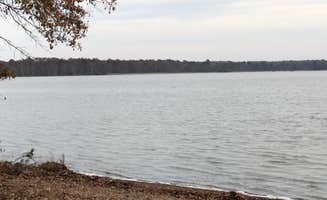Dispersed camping near Providence Forge, Virginia involves primitive sites with seasonal considerations that vary throughout the year. The region sits at the confluence of the James and Chickahominy Rivers within the coastal plain, where summer temperatures often exceed 90°F with high humidity. Winter camping requires preparation for occasional below-freezing nights, while spring and fall typically offer the most comfortable conditions. Campers should note that hunting seasons affect accessibility and safety at Wildlife Management Areas.
What to do
Fishing from shore or boat: The James and Chickahominy Rivers provide excellent fishing opportunities for bass, catfish, and other species. At Ware Creek Wildlife Management Area, campers report success with minimal equipment. "Got here late as the sun was going down. Camped in the RAV4. Will explore the area in the morning," noted one visitor who took advantage of the convenient vehicle access for overnight fishing.
Wildlife observation: Tidal marshes and forests host diverse bird species and wildlife. Chickahominy Wildlife Management Area Site (WMA) attracts photographers and birders. "Basic parking spot in quite location. Weekends some hunters and shooting range close by in other side," reports one camper, highlighting the site's quieter weekday periods for wildlife viewing.
Hiking local trails: Unmarked paths throughout the region offer exploration opportunities. Winter visitors often report clearer trails with less vegetation. The area provides good terrain for day hikes from established camping spots.
What campers like
Waterfront positioning: The ability to camp directly beside water ranks among top camper preferences. "Car camped here 5 feet from the water. There is a large shoreline area to Car camp and right up the hill is a nice tent site as well overlooking the river," reports a winter visitor to Eagle Nest Lookout.
Privacy in off-seasons: Weekday camping during non-hunting seasons provides more solitude. "We ended up having the place to ourselves once all the people Fishing left," notes one camper, suggesting that timing visits during weekdays increases privacy.
Cost-effective access: The $4 daily use fee for non-residents makes these sites budget-friendly alternatives to developed campgrounds. Virginia residents can camp for free with appropriate licenses. "Basic parking spot in quite location... you can purchase $4 daily pass or if Virginia residents free 14 days camping complementary as well with any fishing license or hunting license if you have."
What you should know
Trash management issues: Campers consistently report litter problems at multiple sites. "It is a great shame that people would desecrate such a beautiful area with trash and a blatant disregard for others! We arrived and set up camp around 3pm. There was quite a bit of trash dispersed in this are in which we picked up," notes one visitor to Ware Creek Wildlife Management Area.
Noise considerations: Shooting ranges operate near several camping areas. "Be aware that you will be able to hear the shooting range up till the evening. In my opinion these areas are not necessarily the best place for quiet secluded camping."
Confusing navigation: Some sites have unclear access points. One visitor advises: "Helpful hint: This is the spot by the water. There was confusion because the other site on this app just takes you near the gun range and it is not by the water."
Tips for camping with families
Elevated camping spots: For families with young children, consider the raised areas away from water. "There is a raised area—about 20' above the drivable area—that would be perfect for a campfire and a tent or two," notes a visitor to Chickahominy Wildlife Management Area Site (WMA).
Fire preparation: Bring your own firewood and fire starter as gathering sufficient wood can be challenging. "I was able to find plenty of wood down the road to keep the fire toasty until we went to bed," reports one camper, though this may require time and effort.
Safety planning: Cell service varies throughout the region. Prepare children for wildlife encounters and establish clear boundaries, especially near water.
Tips from RVers
Small trailer access: Most sites accommodate smaller trailers under 20 feet. "I arrived with a small (18') trailer and put it within 5' of the water. Since it's a WMA you can set up anywhere but this place has about 15 cleared areas any one of which I would have been happy with."
Generator restrictions: Unlike some dispersed camping areas, these sites have limitations on generator use. Some campers report inconsiderate noise: "One relieved himself at his truck on the side We were on and moved on the side with the larger group of cars, truck and campers. To add insult to injury this group ran their generators up until 4:30 am."
Level parking considerations: Scout locations before committing, as some waterfront sites have uneven terrain that makes trailer leveling difficult.


